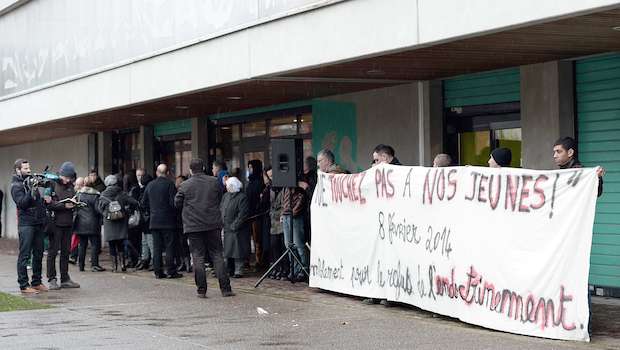
Residents of Strasbourg, France, protest against indoctrination of teenagers for jihad in Syria in this February 8, 2014, file photo. (AFP PHOTO/FREDERICK FLORIN)
London, Asharq Al-Awsat—Several European countries have launched fresh efforts to prevent their citizens traveling to join the fighting in Syria, ahead of a meeting scheduled for April 30 between French, Belgian, German and British officials to discuss the issue.
On Wednesday, the British Metropolitan Police, which is responsible for policing the capital as well as national anti-terrorist efforts, announced a campaign aimed at persuading young British Muslims against travelling to Syria to join the fighting.
The campaign was launched on Thursday with events in the cities of London, Manchester and Birmingham. It aims to bring together anti-terrorism police, officials charged with preventing radicalization, and members of the Muslim community to help dissuade would-be fighters from travelling to Syria.
According to the police, the number of British citizens detained after returning to the UK from Syria has risen in recent months. Around 40 people were detained in the first three months of 2014, compared to 25 in the whole of 2013.
Several have subsequently been charged with terrorism offenses.
The Deputy Assistant Commissioner of the Metropolitan Police, Helen Ball, told reporters: “I understand that some people have a really strong belief that they must go [to Syria]. I understand that. My concern is that they will arrive as a stranger and have no idea who is aligned to whom and they will end up being preyed upon by terrorist groups.”
Ball said she hoped women would play a key role in preventing their relatives from being swept away by “the lure of Syria.”
“We want to ensure that people, particularly women, who are concerned about their loved ones are given enough information about what they can do to prevent this from happening,” she added.
However, some have criticized the moves as ineffective and possibly counterproductive.
I don’t think it’s going to be effective,” community leader Arif Syed told the Guardian newspaper, citing the case of Abdul Waheed Majeed, a British man who was killed carrying out a suicide bombing in Syria in February.
“In the case of Majeed, his wife, his mother told him not to go, his sister told him to not to go and he didn’t take any notice of them. People will do what they want to do…This is a very complicated issue and this government is running out of ideas. There has been a lot of talk and nothing credible is coming out of it. I think it’s scaremongering. It’s not individual freedom fighters travelling from the UK that will make any difference, they will only lose their lives,” he said.
On Wednesday, French authorities also unveiled new measures aimed at preventing its citizens—especially minors and young people—from travelling to Syria. The French government estimates that over 250 of its citizens are present in the country, while 130 have already returned.
During an interview with a French TV station, Interior Minister Bernard Cazaneuve said a hotline would be set up where parents could get help from officials in the social services or education system if they suspected their children planned to travel to Syria.
French citizens returning from Syria could also face charges of being members of terrorist organizations.
Those suspected of planning to travel to Syria to take part in the fighting could also have their passports withdrawn, according to press reports, while their names will be circulated to other EU member states to prevent them attempting to travel to Syria via another country.
